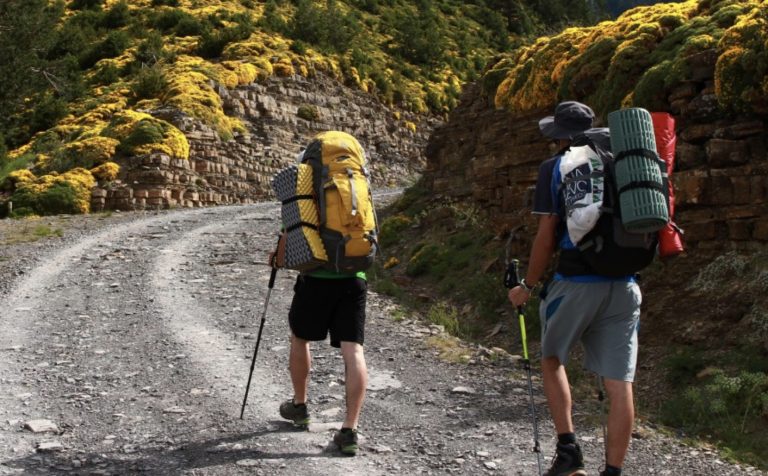Taking to the trails with nothing but your essentials on your back is the ultimate outdoor adventure. Planning a successful backpacking trek can require a lot of attention to detail. The hike length, location, and weather forecast will all play a role in determining what you need to bring on your expedition. Here you will find a comprehensive guide to all the essentials to ensure you are comfortable and prepared for your adventure.
Story Stages
Hiking Boots
When hiking the backcountry, you will need footwear with strength and support. A hiking boot provides optimum coverage preventing sprains, with stiff midsoles that offer more sturdiness for carrying heavier loads. Regular sneakers or tennis shoes are better left at home to avoid injuries. Most backpacking boots offer a higher cut that wraps above the ankles for support, which is beneficial when hiking in the backcountry for many days. Additionally, hiking footwear is specifically functional and responsive to changing environments and surfaces.
Socks
Hiking socks are essential to ensure the most comfortable hike possible. You want to enjoy the trail without thinking about discomfort when taking steps. The difference between good hiking socks and regular cotton socks is that hiking socks will keep your feet dry, less sweaty, and cushioned, preventing painful blisters from forming if your hiking boots rub against a particular part of your foot. Taking the time to be sure you choose a high-quality sock will be advantageous and only benefit you on your trip. A good hiking sock is durable, maintains its comfort, and is fit for miles upon miles of trails.
Backpack
Backpacks are arguably the most critical piece of backpacking gear. They will hold all your gear for overnight stays, and if they are well-made, they will feel comfortable during your hike. For overnight trips, you will need a backpack that is the correct size to accommodate your equipment. In addition, it is essential to ensure that the backpack is lightweight to help limit the overall weight of your load. Consider visiting a genuine outdoor gear store where you can speak to an expert who will help you find one suitable for your trip.
Tent
In the wilderness, your shelter is your home away from home. Tents designed for vehicle camping are often too heavy and bulky for backpackers to carry on longer hikes. You can use your car camping gear for short overnights, but a lightweight tent is best for longer backpacking trips. A good measure guide is 3 pounds per person. It is essential to consider how many people will sleep inside the tent and what weather you might experience.
Sleeping Bag
A suitable sleeping bag and pad while backpacking are vital to having a comfortable adventure. In the same way as a tent, sleeping bags meant for casual camp settings are less suitable for backcountry adventures. You can find one whose temperature rating is consistent with the local climate. A summer bag will not help you stay warm all night long if it is 30° outside. Consider choosing a mummy bag, as the narrow cut will help trap warmth and keep you toasty all night.
Sleeping Pad
A quality sleeping pad is integral to your overall warmth and comfort. You will have a better trip if you get an excellent night’s sleep. Inflatable sleeping pads are comfortable and packable. You can choose an insulated model suitable for three seasons. Foam pads are ideal for beginners or those seeking to lighten their packs.
Stove and Food
When you are tired after a long hike, nothing satisfies like a hot meal. You can bring freeze-dried backpacking meals, which require only boiling water to prepare the evening meal when you are tired. Alternatively, you can pack items to prepare and cook over the stove. When it comes to cooking, a canister stove is the most affordable, lightweight, and easiest to operate. Practice using it at home before bringing it into the backcountry, and ensure you have plenty of fuel.
Water-Treatment
Having suitable drinking water on the trail is essential. It keeps your body hydrated, which can prevent dehydration-related injuries. Water purification is critical to ensure your water is safe. You can boil your water or use a chemical treatment to purify it. These methods are highly effective when used correctly.
Backpacking excursions can add real adventure to your life. They teach you important lessons and allow you to explore new places. The more you backpack, the more confident you will become with your overnight gear and systems, your backpacking style, and your ability to enjoy it.
